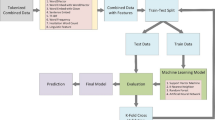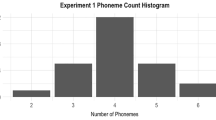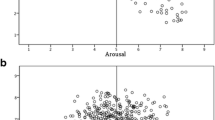Abstract
This study evaluated the effects of the linguistic context on the recognition of words in noise in older listeners using the Spanish Sentence Lists. These sentences were developed based on the approach of the SPIN test for the English language, which contains high and low predictability (HP and LP) sentences. In addition, the relative contribution of peripheral hearing sensitivity, measured by pure-tone hearing thresholds (PTA), to the performance on both types of sentences was assessed in a regression analysis. The results showed that older listeners obtained benefits on word recognition from the linguistic context. PTA contributed significantly to explaining the variance in performance on both HP and LP sentences.


Similar content being viewed by others
References
Akeroyd, M. A. (2008). Are individual differences in speech reception related to individual differences in cognitive ability? A survey of twenty experimental studies with normal and hearing-impaired adults. International Journal of Audiology, 47(Suppl. 2), S125–S143.
Alameda, J. R., & Cuetos, F. (1995). Diccionario de frecuencias de las unidades lingüísticas del castellano. Oviedo: Servicio de publicaciones de la Universidad de Oviedo (Spain).
Barón de Otero, C., Brik, G., Flores, L., Ortiz, S., & Abdala, C. (2008). The Latin American Spanish hearing in noise test. International Journal of Audiology, 47, 362–363.
Benichov, J., Cox, L. C., Tun, P. A., & Wingfield, A. (2012). Word recognition within a linguistic context: Effects of age, hearing acuity, verbal ability, and cognitive function. Ear and Hearing, 33, 250–256.
Cattell, R. B. (1971). Abilities: Their structure, growth, and action. New York: Houghton Mifflin.
Cervera, T., & Gonzalez-Alvarez, J. (2010). Lists of Spanish sentences with equivalent predictability, phonetic content, length, and frequency of the last word. Perceptual and Motor Skills, 111(2), 1–13.
Cervera, T., & Gonzalez-Alvarez, J. (2011). Test of Spanish sentences to measure speech intelligibility in noise conditions. Behavior Research Methods, 43, 459–467.
Davis, A. (1995). Hearing in adults. London: Whurr Publishers Ltd.
Demeester, K., van Wieringen, A., Hendrickx, J., Topsakal, V., Fransen, E., van Laer, L., et al. (2009). Audiometric shape and presbycusis. International Journal of Audiology, 48, 222–232.
Divenji, P. L., Stark, P. B., & Haupt, K. M. (2005). Decline of speech understanding and auditory thresholds in the elderly. The Journal of the Acoustical Society of America, 118, 1089–1100.
Dubno, J. R., Ahlstrom, J. B., & Horwitz, A. R. (2000). Use of context by young and aged adults with normal hearing. The Journal of the Acoustical Society of America, 107, 538–546.
Florentine, M. (1985). Non-native listeners of American-English in noise. Proceedings of Inter-Noise’, 85, 1021–1024.
Folstein, M. F., Folstein, S. E., & McHugh, P. R. (1975). “Mini Mental State”: A practical method for grading the cognitive state of patients for the clinician. Journal of Psychiatric Research, 12, 189–198.
Golestani, N., Hervais-Adelman, A., Obleser, J., & Scott, S. K. (2013). Semantic versus perceptual interactions in neural processing of speech-in-noise. Neuroimage, 79, 52–61.
Gordon-Salant, S., & Fitzgibbons, P. J. (1997). Selected cognitive factors and speech recognition performance among young and elderly listeners. Journal of Speech, Language, and Hearing Research, 40, 423–431.
Hagerman, B. (1982). Sentences for testing speech intelligibility in noise. Scandinavian Audiology, 11, 79–87.
Helfer, K. S. (2009). Older adults in complex listening environments. In Hickson, L. (ed.) Hearing care for adults 2009—the challenge of aging. Proceedings of the second international adult conference, pp. 237–245.
Hochmuth, S., Brand, T., Zokoll, M. A., Castro, F. Z., Wardenga, N., & Kollmeier, B. (2012). A Spanish matrix sentence test for assessing speech reception thresholds in noise. International Journal of Audiology, 51, 536–544.
Horn, J. L. (1982). The theory of fluid and crystallized intelligence in relation to concepts of cognitive psychology and aging in adulthood. In F. I. M. Craik & S. Trehub (Eds.), Aging and Cognitive Processes (pp. 237–278). New York, NY: Plenum.
Huarte, A. (2008). The Castillian Spanish hearing in noise test. International Journal of Audiology, 47, 369–370.
Humes, L. E. (1996). Speech understanding in the elderly. Journal-American Academy of Audiology, 7, 161–1967.
Hutchinson, K. M. (1989). Influence of sentence context on speech perception in young and older adults. Journal of Gerontology, 44, P36–44.
Kalikow, D. N., Stevens, K. N., & Elliot, L. L. (1977). Development of a test of speech intelligibility in noise using sentence materials with controlled word predictability. The Journal of the Acoustical Society of America, 61, 1337–1361.
Lobo, A., Saz, P., Marcos, G., Día, J. L., Cámara, C., Ventura, T., et al. (1999). Revalidación y normalización del Mini-Examen cognoscitivo (primera versión en castellano del Mini-Mental Status Examination) en la población general geriátrica. Med Clín, 112, 767–774.
Mayo, L. H., Florentine, M., & Buus, S. (1997). Age of second-language acquisition and perception of speech in noise. Journal of Speech, Language, and Hearing Research, 40, 686–693.
McCullought, J. A., & Wilson, R. H. (2001). Performance on a Spanish picture-identification task using a multimedia format. Journal of the American Academy of Audiology, 12, 254–260.
Moreno Fernandez, F. (Ed). (2012). El español: una lengua viva. Informe 2012. Instituto Cervantes. (pp. 3–4).
Nilsson, M., Soli, S. D., & Sulivan, J. A. (1994). Development of the hearing in noise test for the measurement of speech reception threshold in quiet and in noise. Journal of the Acoustical Society of America, 95, 1085–1099.
Pichora-Fuller, M. K. (2008). Use of supportive context by young and older adult listeners: balancing bottom-up and top-down information processing. International Journal of Audiology, 47(Suppl. 2), S72–S82.
Pichora-Fuller, M. K., Schneider, B. A., & Daneman, M. (1995). How young and old adults listen and remember speech in noise. The Journal of the Acoustical Society of America, 97, 593–608.
Pichora-Fuller, M. K., Schneider, B. A., MacDonald, E., Pass, H. E., & Brown, S. (2007). Temporal jitter disrupts speech intelligibility. Hearing Research, 223, 114–121.
Plomp, R. (1978). Auditory handicap of hearing impairment and the limited benefit of hearing aids. The Journal of the Acoustical Society of America, 63, 533–549.
Rönnberg, J., Rudner, M., Foo, C., & Lunner, T. (2008). Cognition counts: A working memory system for ease of language understanding (ELU). International Journal of Audiology, 47(2), S99–S105.
Roth, T. N., Hanebuth, D., & Probst, R. (2011). Prevalence of age-related hearing loss in Europe: A review. European Archives of Oto-Rhino-Laryngology, 268, 1101–1107.
Sheldom, S., Pichora-Fuller, M. K., & Schneider, B. A. (2008). Priming and sentence context support listening to noise-vocoded words. The Journal of the Acoustical Society of America, 123, 489–499.
Schum, D. J., & Matthews, L. J. (1992). SPIN test performance of elderly hearing-impaired listeners. Journal of the American Academy of Audiology, 3, 303–307.
Stenfeld, S., & Rönnberg, J. (2009). The signal-cognition interface: Interactions between degraded auditory signals and cognitive processes. Scandinavian Journal of Psychology, 50, 385–393.
Wingfield, A., & Stine-Morrow, E. A. L. (2000). Language and speech. In F. I. M. Craik & T. A. Salthouse (Eds.), Handbook of cognitive aging (2nd ed., pp. 357–416). Mahwah: Erlbaum.
Wingfield, A., & Tun, P. A. (2007). Cognitive supports and cognitive constraints on comprehension of spoken language. Journal of the American Academy of Audiology, 18, 548–558.
Wingfield, A., Tun, P. A., & McCoy, S. L. (2005). Hearing loss in older adulthood. What it is and how it interacts with cognitive performance. Current Directions in Psychological Science, 14, 144–148.
Acknowledgments
This research was supported in part by research Grant FFI 2011-25947 (Ministry of Science and Innovation, Spain).
Author information
Authors and Affiliations
Corresponding author
Rights and permissions
About this article
Cite this article
Cervera, T., Rosell, V. The Effects of Linguistic Context on Word Recognition in Noise by Elderly Listeners Using Spanish Sentence Lists (SSL). J Psycholinguist Res 44, 819–829 (2015). https://doi.org/10.1007/s10936-014-9321-7
Published:
Issue Date:
DOI: https://doi.org/10.1007/s10936-014-9321-7




